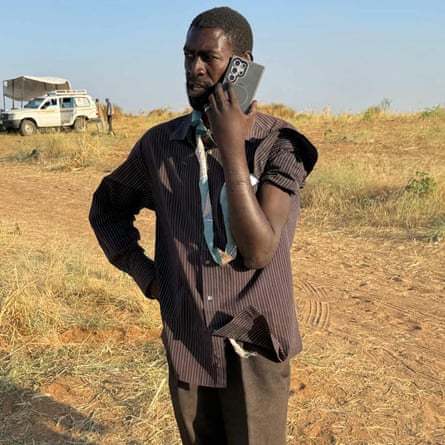Nawal Khalil had been volunteering as a nurse for three years at El Fasher South hospital when the Sudanese city was captured on Sunday by the Rapid Support Forces (RSF). She was busy treating patients, including an elderly woman who needed a blood transfusion, when the attack began.
“They killed six wounded soldiers and civilians in their beds – some of them women,” she says. “I don’t know what happened to my other patients. I had to run when they stormed the hospital.”
Khalil, 27, was shot in the right foot and thigh as RSF fighters took control of the nearby military headquarters. She fled the city and walked for a day, injured and without food, to reach the town of Garney. “On the way, they took my phone and money. I was left with nothing,” she says.
More than 1,000 people – including women and children – walked for two days to reach the town of Tawila in North Darfur after fleeing El Fasher, which was captured after an 18-month siege.
Tawila, about 34 miles (55km) west of El Fasher, is under the control of the Sudan Liberation Army faction led by Abdul Wahid Mohamed al-Nur (SLA-AW).
On Tuesday, the Joint Forces – who are allied with Sudan’s army – accused the RSF of killing more than 2,000 civilians since the fall of the city. The UN said there were videos showing “dozens of unarmed men being shot or lying dead, surrounded by RSF fighters”.
According to witnesses, thousands more civilians remain trapped by the RSF and allied militias in Garney, south-west of El Fasher. Many are former soldiers from the Sudanese army, the Joint Forces and other armed groups that had been fighting alongside the army. They are reportedly being held because they cannot afford ransom demands of between 5m and 10m Sudanese pounds (£6,000 to £12,000), according to survivors who made it to Tawila. Those unable to pay have been detained for days, and in some cases released only after becoming gravely ill.
The SLA-AW has reportedly allowed government troops fleeing El Fasher to enter Tawila on condition they surrender their weapons.

Adam Yagoub, 28, a driver from Sennar in central Sudan, narrowly escaped being killed after being captured by three militiamen on camels near Garney.
“They wanted to cut my head off with a knife,” he tells the Guardian, showing his arm, which one of the fighters hit with the butt of an AK-47 rifle. “Then one of them recognised me – his brother had worked with me – and begged them not to kill me. We were 18 people who left El Fasher together, but only eight made it to Tawila. I think the others are dead.”
Yagoub says he saw 22 bodies near what he called a “fake well” used by the RSF and allied militias between Garney and Tawila. “It’s a trap,” he says. “People walk all day without water, and when they reach it, the militias are waiting. They killed 22 men there and took the bodies away to hide them.”
Another nurse who escaped El Fasher South hospital after the attack on Sunday said RSF fighters entered through one gate and opened fire on patients in the emergency ward, killing at least eight. “We fled through another gate, but they hit me on the head with a rifle,” he says.
In a video statement on Wednesday, the head of the RSF, Gen Mohamed Hamdan Dagalo, known as Hemedti, said that any soldier or officer who had “violated the right of any person” would be held accountable.
Many of those who escaped El Fasher spent hours hiding near the army’s artillery unit before fleeing west under cover of darkness. Already displaced families from the city’s Abu Shouk camp were forced to move again, seeking refuge in the Daraja Oula neighbourhood before eventually heading for Tawila.
Those captured by the RSF in Garney were reportedly given water mixed with flour to revive them after they had walked for a day without supplies. Survivors said people were then separated by gender and perceived affiliation: men suspected of being fighters were detained, while some civilians were released or freed after paying ransoms.
The SLA-AW has deployed additional fighters around Tawila “to protect those fleeing El Fasher and to prevent clashes if the RSF pursues armed groups who have retreated with their weapons”, a local commander said.
It is understood that elements of the Sudanese army and allied groups continue to resist in the Jebel Wana area, north-west of El Fasher, after losing control of the city.
Médicins Sans Frontières (MSF) says it is facing a large influx of people to its clinic in Tawila hospital.
“More than 1,000 people arrived [from El Fasher] at night on foot and in trucks, after an extremely dangerous journey. Many were in a state of great weakness suffering from malnutrition and dehydration,” says MSF project coordinator Sylvain Penicaud.
Disclaimer : This story is auto aggregated by a computer programme and has not been created or edited by DOWNTHENEWS. Publisher: theguardian.com









